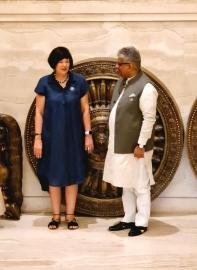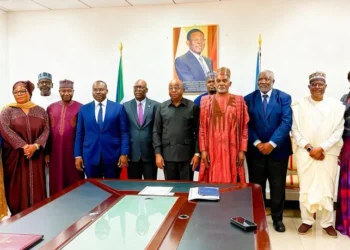Minister of Forestry, Fisheries and the Environment, Barbara Creecy, has reaffirmed South Africa’s commitment to addressing global challenges, particularly in the areas of climate change and sustainability.
Addressing the G20 Environment and Climate Sustainability Ministerial meeting in India, she said South Africa is currently engaged in a marine spatial planning process to guide future marine conservation and sustainable use of the ocean resources.
“South Africa has jurisdiction over one of the world’s largest exclusive marine economic zones in the world. This represents a significant asset for current and future generations, with enormous environmental significance and socio- economic potential,” Creecy said on Friday.
The Minister also reiterated South Africa’s commitment to the sustainable regulated use of fishing resources; the active prevention of illegal and unregulated fishing and the incorporation of traditional small-scale fishers into the fishing sector through the allocation of fifteen-year rights to qualifying applicants.
“We remain committed to the international agreement of a legally binding instrument on plastic pollution, including in the marine environment. To counteract marine plastic pollution we are actively engaged in supporting municipalities to improve household waste collection and landfill compliance as well as building an active waste reclaiming and recycling industry.
“As we tackle climate change we must continue to strive for greater balance and ambition and action on all three aspects of the Paris Agreement, namely mitigation, adaptation and the means of implementation. We must also adhere to the Rio Principles, in particular equity and common but differentiated responsibilities and respective capabilities, which are also applicable within the G20 context,” the Minister said.
Creecy explained the importance of the G20 tackling existential challenges for humanity.
“No single country can on its own address climate change, biodiversity loss and pollution. The importance of the G20 is the momentum it can create for common ambition in tackling these existential challenges for humanity. However, as we sit here today, we must maintain momentum behind the United Nations system and not pre-empt or revisit negotiated outcomes,” the Minister said.
The Ministerial meeting will consider recommendations prepared by senior officials in the G20’s Environment and Climate Sustainability Working Group (ECSWG).
The Indian G20 Presidency has focused on three priority issues under the ECSWG, namely:
1. Arresting land degradation and accelerating ecosystem restoration via an ecosystem-based approach, and enriching biodiversity;
2. Promoting a sustainable and climate-resilient blue economy to protect the natural environment and the lives and livelihoods dependent on marine resources;
3. Encouraging resource efficiency and circular economy to move towards sustainable production and consumption systems.































































